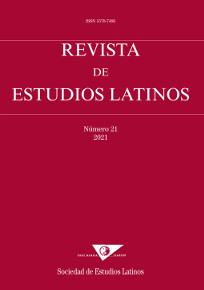From the origin of ŭlŭlare ‘to howl’ to that of adūlare ‘to adulate’ and Spanish aullar ‘to howl’
DOI:
https://doi.org/10.23808/rel.v21i21.92716Keywords:
etymology, lexical family, onomatopoeia, preverbation.Abstract
The term ulula (< *ul-ul-) ‘tawny owl’ was formed by imitating the song of certain nocturnal birds. This onomatopoeic form with resonance in other Indo-European languages gave rise to the verb ŭlŭlare ‘to howl’. This verb is also based on the Indo-European name for the wolf (*wḷ-kwos, cf. lat. Vl-pius) and it is also the term for the howling of a dog. Etymologists have not yet noted that the second verb in our title is lexically based on the first and that the third contains the same preverb as the second. Indeed, the base of ad-ūlare is the result of the dissimilation of the first -l- and subsequent vowel contraction of -ŭlŭlare > *-ŭŭlare > -ūlare. In turn, Spanish aullar has as lexical basis the vulgar form *-ūlulare > *-ūl(u)lar(e) > -ullar, modified by the preverb ad- that reinforces the adlative sense. While ad-ūlare became specialized in the concept of canine and human adulation, *a(d)-ullar > aullar has retained the original reference to howling.
Downloads
Downloads
Published
How to Cite
Issue
Section
License
Copyright (c) 2021 Revista de Estudios Latinos

This work is licensed under a Creative Commons Attribution-NonCommercial-NoDerivatives 4.0 International License.
The originals published in the printed and electronic editions of this journal are the property of the Revista de Estudios Latinos and can be circulated as long as the original source and authorship is made clear in any reproduction, full or partial, of the same, and as long as this is not done for commercial purposes.






